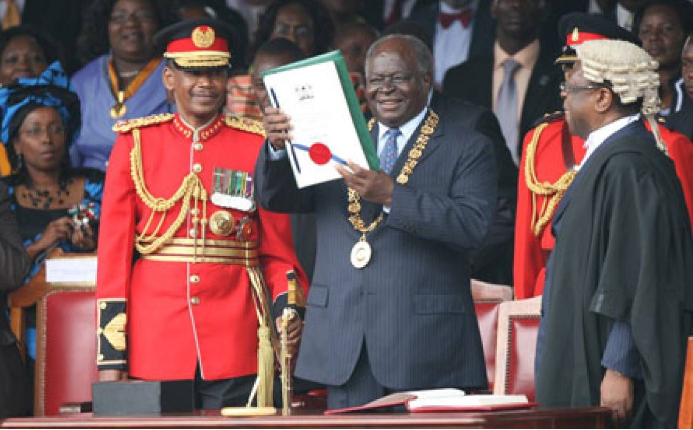
Kenya marked 11 years since the promulgation of the country’s Constitution on August-27th-2010. Representatives drawn from various organizations including Linda Katiba, Kenya Human Rights Commission, Katiba Institute among others gathered at the Hilton Hotel in the capital, Nairobi, where Kenyans were called upon to safeguard the country’s constitution

“This Constitution might not be perfect, however, it is the birth certificate and the legal foundation for the existence of a constitutional democratic Kenyan society which commits us individually and collectively to build a nation,” said Wanjeri Nderu, member of Linda Katiba.
The 2010 Constitution of Kenya, currently in force, replaced the 1969 constitution, that itself had replaced the 1963 independence constitution. The constitution was presented to the Attorney General of Kenya on 7th April 2010, officially published on6 May 2010, and was subjected to a referendum on 4 August 2010. The current Constitution was approved by 67% of Kenyan voters and promulgated on 27th

At the backdrop of making of the 2010 Kenyan Constitution, was the aftermath of the 2007/2008 post-election violence that had erupted following what was termed as disputed presidential elections. The 2009/10 constitutional review process was thus conceptualized through a Kenya National Accord and Reconciliation process ledby the African Union Panel of Eminent African Personalities chaired by the late and former UN Secretary General Kofi Annan.
When the 2007/08 election protagonists, former president Mwai Kibaki and opposition leader Raila Odinga agreed to a truce, the reconciliation process identified long term issues that had to be addressed if Kenya was to move forward and avoid perennial conflicts; A constitutional text that was hailed as being liberal, transformative and a cure for Kenya’s electoral violence cycles, was bore, which later became the 2010 constitution. Some of the key long-term issues the reconciliation process that brought about the promulgation of Kenya’s 2010 Constitution identified for action included:
1.Transparency, accountability and impunity
2.Youth unemployment
3.Land reforms
4.Constitutional, institutional and legal reforms
5.Consolidation of national cohesion and unity
6.Poverty, inequality and regional imbalance
11 years later since the promulgation of the 2010 constitution, challenges of implementation are said to emanate from the manner in which aspects of the review process were carried out. On Friday’s commemoration of the constitution, voices championing for its protection said some provisions that were negotiated andincorporated into the document were not fully considered during the review process.
Even as these reflections on the implementation rise, a battle has taken center stage in the country’s legal field; the Court of Appeal on 20th August 2021 upheld a ruling by the Kenyan High Court that declared an initiative that was championing for constitutional amendments unconstitutional.
The Building Bridges Initiative (BBI) has been branded by its opponents as a move meant to share power among a selected few. Even after the recent judgement by the Court of Appeal, the country’s Attorney General Paul Kihara Kariuki, is headed to the Apex court, to challenge the Appellate judges verdict.
Ndung’u Wainaina, the director of the International Centre for Policy and Conflict, speaking at the commemoration of the promulgation of the 2010 Kenya constitutionon Friday, said what Kenyans are seeing today is reminiscence to the 1976 Constitution change and succession plot. Wainaina says the Building Bridges Initiative (BBI), is a “decoy and ploy special purpose vehicle for the 2022 succession politics.”‘
Kenya is not in a constitutional moment. Kenya has been plunged into vicious brazen 2022 political succession madness.” Said Ndung’u Wainaina, Director for ICPC.
One of key things to note is that the 2010 Constitution defines that the Kenyan Government’s top most levels be constituted of the President, the Deputy President and the Executive Cabinet. Constitutions such as that of Kenya do four main things:
1. They define who is the Constituent power?
2. They set out the rights of the power
3. They define the powers of Government
4. They tell you how it can be changed
A major thing noted on the 27th-August-2021 commemoration of the 2010 constitution of Kenya, was that many Kenyans still do not know their rights as per the promises enshrined in the constitution.

‘Kenyans do not know the constitution; they need to read the constitution and know their rights.’ Said Reuben Kigame, Linda Katiba Member
For many Kenyans, the 2010 constitution has remained admirable and progressive, embracing both personal and socio-economic rights. However much remains unimplemented including in areas of inclusion, accountability, and socio-economic equality among others. Organizations seeking to safeguard the constitution, blame the slow implementation on what they call state capture for personal profiteering that they say is “killing not only the country’s governance and the rule of law but also assailing the principles and values of the constitution.”






